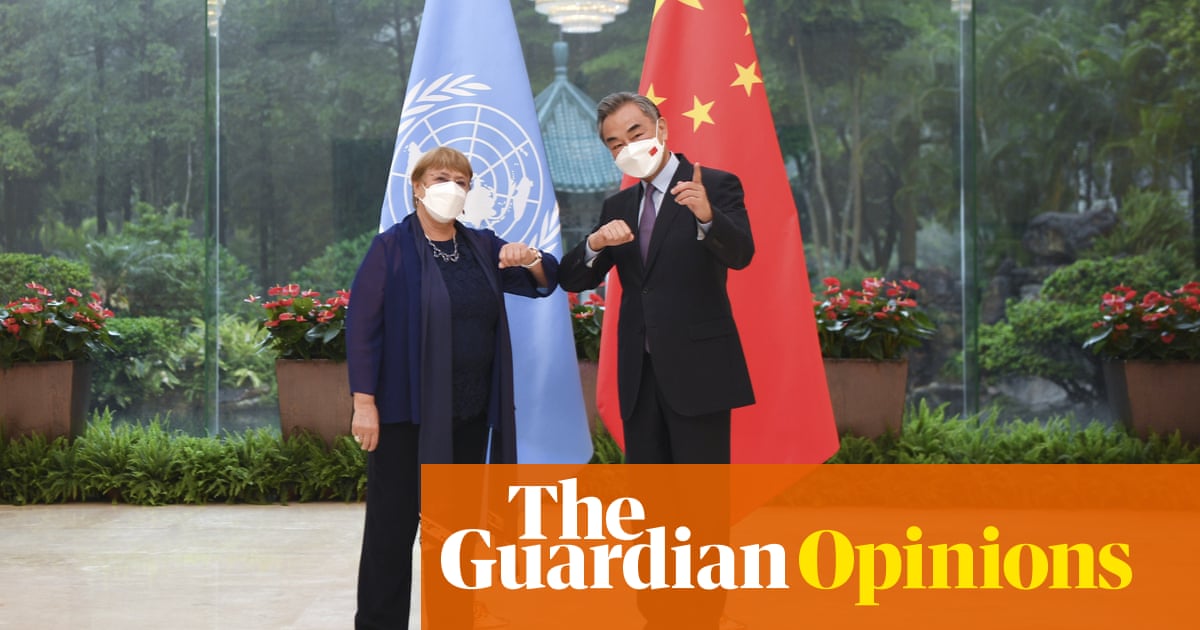The UN’s report on the Uyghurs nearly didn’t see the light of day, thanks to China
Show caption Michelle Bachelet with China’s foreign minister, Wang Yi, in Guangzhou, China, May 2022. Photograph: Deng Hua/AP Opinion The UN’s report on the Uyghurs nearly didn’t see the light of day, thanks to China James McMurray Michelle Bachelet’s report on human rights abuses in Xinjiang is sobering – as are Beijing’s attempts to stop it being published Thu 1 Sep 2022 15.37 BST Share on Facebook
Share on Twitter
Share via Email
On Wednesday, minutes before the midnight end of her four-year appointment as UN high commissioner for human rights, Michelle Bachelet’s office at last published her long-delayed report into the continuing human rights abuses in the Xinjiang region of China. That it would do so remained uncertain to the last. Just the day before, it was being reported that her term would come to an end with the issue unresolved, despite numerous demands at Tuesday’s meeting of the human rights council – including from Britain’s ambassador to it, Rita French – that the report be released.
For scholars of Xinjiang, the uncertainty was nothing new. Despite the commissioner’s assurances that the report would be published, there had been reasons to doubt her willingness to challenge Beijing. In May, after the first visit of a high commissioner to China for nearly two decades, she released an official statement that was couched in the language of the Chinese state, and failed to mention nearly all of the concerns that had been raised about the mistreatment of the Uyghurs and other inhabitants of the region.
The failure of Bachelet to meaningfully challenge China’s actions in Xinjiang at that time, however, was probably inevitable. Though she had asked for observers to be given unfettered access to the region from the very first few days in the job, she had been repeatedly denied, and ultimately could visit only under the strict conditions set by Beijing. While she acknowledged in June that such a visit could not be an investigation, she argued that her own experience of exile from Chile in the 1970s, and her family’s suffering, had taught her the value of dialogue, whatever the limitations.
The difficulty of securing access has long been familiar to academics and journalists who work on Xinjiang-related issues, and over the past five years it has largely become impossible. This is not least because it has become so dangerous for locals to discuss anything of importance with foreigners. Also familiar is the pressure exerted by China to cease any investigation. Scholars who have prominently discussed the mass internments and other atrocities in Xinjiang have been sanctioned and vilified by Beijing as part of its strenuous efforts to control how its policies in the region are perceived. These efforts have, since 2017, followed a similar pattern: deny what is happening until the evidence is overwhelming, then attempt to recast that evidence in a positive light (such as, for example, by casting the camps as “vocational training centres”), then condemn and punish those bringing the truth to light.
It is clear that Bachelet and her office have been under the same pressures. In July, documents anonymously leaked by numerous diplomats to the office of the high commissioner revealed that China was directly lobbying for the report not to be released. Last week, she acknowledged the intense pressure being exerted over the publication of the report, and that she was “trying very hard” to release it before the end of her tenure. Earlier statements indicate that the office has been “finalising” the report since September last year. That it has been held back in the period since suggests that, at the least, there were fears that publication would end any cooperation from China for the period of her tenure.
The report itself is sobering. Drawing on official documents requested from the Chinese state, the office’s own interviews with victims who have fled China and academic documentation, it recognises the large-scale internments, credible reports of torture and widespread mistreatment that have been reported since 2017. The office’s recognition, as a high commission of the UN, that such mistreatment may include crimes against humanity – in violation of international law – is extremely significant. That is apparent both from the great efforts Beijing has undertaken to prevent the report’s publication and from its formal response, which rejects the findings as “based on disinformation and lies” and characterises it as “wanton” slander.
The high commissioner’s report tells us little about the continuing outrages in Xinjiang that we didn’t already know, but the circumstances of its publication, at minutes to midnight, as she was on her way out of the door, is a stark reminder of how much pressure China is bringing to bear to turn aside the eyes of the world. And that is something that cannot be tolerated.
Dr James McMurray is a lecturer in anthropology and a member of the Asia Centre at the University of Sussex











